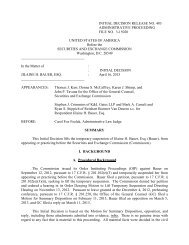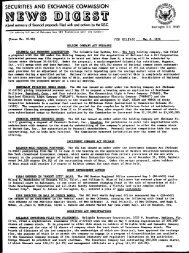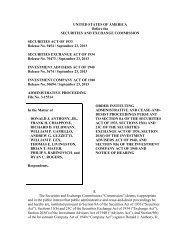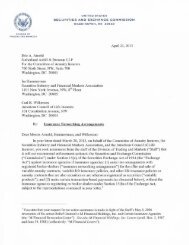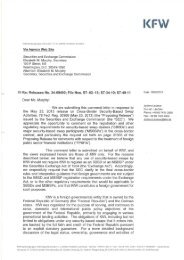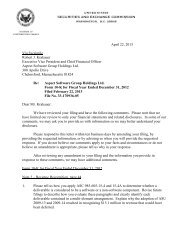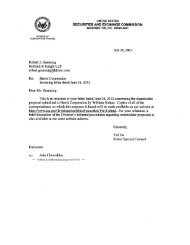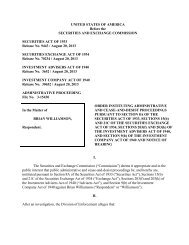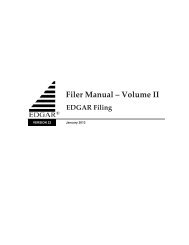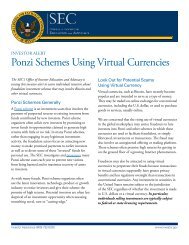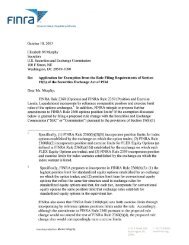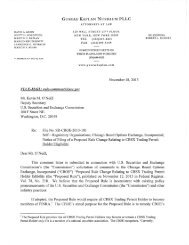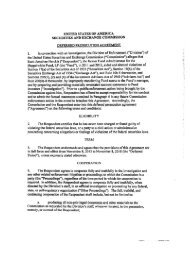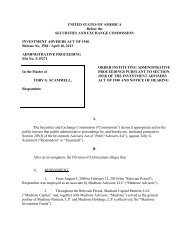Commission Opinion: ROBERT J. PRAGER and JAMES ALEXANDER
Commission Opinion: ROBERT J. PRAGER and JAMES ALEXANDER
Commission Opinion: ROBERT J. PRAGER and JAMES ALEXANDER
Create successful ePaper yourself
Turn your PDF publications into a flip-book with our unique Google optimized e-Paper software.
20<br />
history. Alex<strong>and</strong>er claimed at the hearing to have "stepped up" his supervision of Rosen after<br />
learning that Rosen had asserted his Fifth Amendment rights in refusing to testify or produce<br />
requested documents. 48/ As NASD found, however, that claim was belied by Alex<strong>and</strong>er's<br />
admission that his supervision of Rosen was essentially no different from his supervision of other<br />
employees.<br />
Even after the firm lost over $1 million from Rosen's H&R stock trading, <strong>and</strong> despite<br />
Newberg's repeated warnings about Rosen's continuing dealings with Mitton <strong>and</strong> Heredia after<br />
the H&R manipulation had ended, Alex<strong>and</strong>er did nothing to ensure Rosen's compliance with<br />
applicable securities laws <strong>and</strong> NASD rules. These "red flags <strong>and</strong> suggestions of irregularities"<br />
regarding Rosen's conduct dem<strong>and</strong>ed Alex<strong>and</strong>er's "inquiry as well as adequate follow-up <strong>and</strong><br />
review." 49/ Alex<strong>and</strong>er simply ignored them. We conclude that Alex<strong>and</strong>er violated NASD<br />
Conduct Rules 3010 <strong>and</strong> 2110 by failing to supervise adequately Rosen's activities, <strong>and</strong> failing to<br />
establish, maintain, <strong>and</strong> enforce written supervisory procedures "reasonably designed to achieve<br />
compliance" with applicable laws <strong>and</strong> rules. 50/<br />
IV.<br />
Alex<strong>and</strong>er raises a variety of procedural challenges to the fairness of the proceedings<br />
before NASD, none of which has merit. Alex<strong>and</strong>er first contends that he cannot be found to<br />
have failed adequately to supervise Rosen in the absence of any finding that Rosen was liable for<br />
his involvement in the H&R manipulation. 51/ A determination that a respondent has violated<br />
NASD's supervisory rule is not dependent on a finding of a violation by those subject to the<br />
48/ Alex<strong>and</strong>er's "stepped up" supervision purportedly consisted of monitoring the filings of<br />
companies whose stock Rosen traded to determine if the names of any promoters who<br />
were known to deal in shell companies appeared. Under the circumstances, such efforts<br />
were inadequate.<br />
49/ Edwin Kantor, 51 S.E.C. 440, 447 (1993).<br />
50/ NASD concluded that the evidence supported a finding of supervisory failures during the<br />
period from April 1, 1997, through August 1999, instead of August 2000, as alleged in<br />
the complaint. NASD's Department of Enforcement does not dispute this finding.<br />
51/ Alex<strong>and</strong>er frames this argument as an application of the doctrine of respondeat superior,<br />
which holds an employer liable for the wrongs committed by its employee. However,<br />
NASD did not allege that Alex<strong>and</strong>er's supervisory violations were imputed to him by<br />
virtue of respondeat superior. As a result, respondeat superior has no applicability here.<br />
See Michael T. Studer, 83 SEC Docket at 3672 (rejecting applicants' argument that<br />
NASD should not have found that firm churned an account in absence of finding that<br />
employee trading the account churned it; NASD properly found firm liable as primary<br />
violator, <strong>and</strong> did not allege that it was liable based on principle of respondeat superior).



